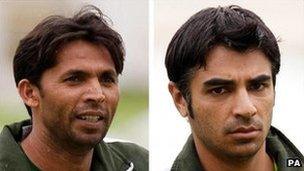Pakistan cricketers' trial: 'Agent asked player to cheat'
- Published

Former Pakistan cricketers Mohammad Asif and Salman Butt are on trial at Southwark Crown Court
Pakistan's former Test cricket captain Salman Butt has admitted his agent asked him to fix matches but said he ignored his requests.
Mr Butt said his agent, Mazhar Majeed, 36, had asked him to intentionally lose wickets at last year's Twenty20 World Cup and to score no runs in an over during the Test against England.
The cricketer told Southwark Crown Court he had rejected the agent's suggestions.
Mr Butt, 27, denies match fixing.
"Never in my whole life have I intended to do anything like that, play a match in a certain way. I always do what is required to the best of my ability," he said.
Prosecutors allege that agent Mr Majeed conspired with Mr Butt and bowler Mohammad Asif, 28, to fix parts of the match between Pakistan and England by delivering three deliberate no-balls.
Both Mr Butt and Mr Asif deny charges of conspiracy to cheat and conspiracy to accept corrupt payments.
Giving evidence in his defence, Mr Butt said the agent rang him on 20 August last year, the eve of the final day of the Oval Test.
In court, the cricketer said Mr Majeed had told him: "You know the maiden that we're doing for the first over? You know the third over you face, do one more maiden."
Mr Butt said he replied: "Bro, just leave it, OK."
Explaining his reaction, the player told the court: "I intended to say, 'That's enough, I've heard enough of that conversation'."
Mr Majeed is said to have spoken to Mr Butt the next day telling him: "Just stick to what we said last night, OK. Just leave it at that. So the first full over you play, make sure you play a maiden."
The cricketer replied in Punjabi, "Theek hai" or "OK", which he said meant that he wanted to end the matter as soon as possible.
"I was trying to get rid of the conversation, not to offend anyone... I was absolutely not interested in what he was talking about."
'Something dodgy'
The night before Pakistan's match against South Africa on 10 May 2010, which they needed to win to reach the semi-final, the agent texted the player: "How about the other thing? One in the seventh over, one in the eighth."
He spelt out in a further message, "One fall in each", which the court heard was a reference to losing wickets.
Mr Butt told the court he did not reply and said he did not report the agent to the International Cricket Council (ICC), as required under their code of conduct, because he believed the agent's claims that he was just testing him.
The cricketer confronted the agent about the texts when he saw him later during the tournament, the court heard.
Mr Butt told the jury: "He said he was just checking if we were ever doing something dodgy like that or not. I just took his word for this explanation."
'Freakish coincidence'
The case stems from a sting operation by the former News of the World newspaper which prompted claims that the men accepted bribes to fix parts of the match.
Defending Mr Butt, Ali Bajwa QC said Mr Majeed had grossly abused the trust Mr Butt placed in him by naming him, Mr Butt, to the journalist as a person involved in match fixing.
Mr Bajwa also explained why Mr Butt told police in an interview that it was a "freakish coincidence" that the no-balls were bowled exactly when Mr Majeed said they would be.
He told the court: "That is not, and has never been, part of Mr Butt's defence.
"We suggest to you that Mr Butt advanced that as a possible explanation, not as a statement of fact."
Mr Butt said he first met Mr Majeed on a tour of England in 2006, although he initially signed up to be managed by the agent's brother, Azhar, the court heard.
He estimated that he earned £1.2m over a seven-year period, including around £750,000 in 2007 to 2010 alone.
Explaining why police found nine mobile phone Sim cards in his hotel room after the match-fixing scandal broke, Mr Butt said it was cheaper to buy local phone cards when he was on tour overseas.
The cricketer also said he brought about $12,000 (£7,600) in cash with him to England last year with the aim of buying a special edition brown Breitling watch costing around £8,000.
The case continues.
- Published14 October 2011
- Published11 October 2011
- Published10 October 2011